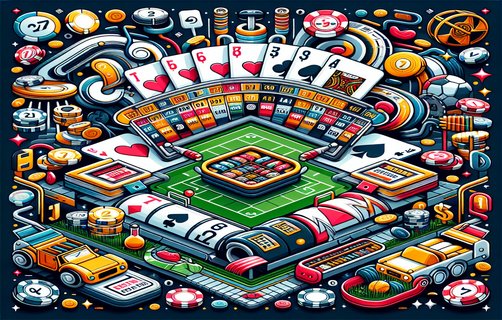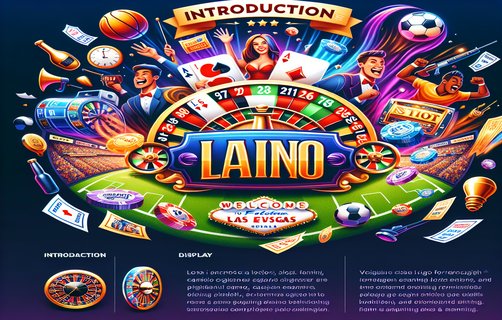The Intricacies of Roulette Gameplay: Balancing Luck and Strategy
रूलेट खेल की जटिलताएँ: भाग्य और रणनीति का संतुलन
Roulette is often perceived as a mere game of chance, yet a comprehensive analysis reveals layers of strategy and elements that can balance the unpredictability of luck. This iconic casino game is not only about spinning the wheel and waiting for the ball to settle but also about understanding how various mechanics interact, potentially influencing outcomes.
Game balancing in roulette involves the distribution of luck-driven gameplay. While the outcome hinges significantly on chance, strategic placement of bets can mitigate risks and enhance the chances of winning. Players must analyze odds carefully, leveraging the various betting options available on the roulette table—inside bets, outside bets, and their corresponding payouts invite a range of strategies.

Cardholders, or players managing their chips, play a crucial role in the game’s dynamics. They engage in risk management, deciding how much to bet and when to walk away. This decision-making process is crucial, as emotional and rational factors intertwine in the rush of the game.
Time limit handicaps impact the flow of gameplay. Players often face a ticking clock, which adds pressure and can lead to hasty decisions. A thoughtful approach would incorporate a strategy that balances time constraints with the necessity for deliberate betting choices.
Territory board adjustments also come into play, particularly in themed casino variants where the standard roulette layout might be adapted. Such modifications may affect player choices and outcomes, adding a unique twist that can redefine traditional strategies.

Deck reshuffling rules, while not traditionally associated with roulette, can influence games that intertwine card mechanisms with wheel spinning—most prevalent in hybrid games. These reshuffling regulations can impact player dynamics, providing opportunities for seasoned players to adopt new strategies based on reshuffled decks.
In conclusion, while roulette undeniably relies heavily on chance, the strategic elements intertwined with gameplay unveil a deeper narrative. By examining game balancing, luck-driven gameplay, and tactical components such as card holders and time limits, one can appreciate roulette not as a game of random outcomes but as an arena where skill, timing, and psychology converge.
रूलेट को अक्सर केवल मौके के खेल के रूप में देखा जाता है, फिर भी एक व्यापक विश्लेषण विभिन्न रणनीतियों और तत्वों की परतें प्रकट करता है जो भाग्य की अप्रत्याशितता को संतुलित कर सकते हैं। यह प्रतिष्ठित कैसीनो खेल न केवल पहिए को घुमाने और गेंद के रुकने का इंतज़ार करने के बारे में है, बल्कि यह समझने के बारे में भी है कि विभिन्न तंत्र कैसे बातचीत करते हैं, संभावित रूप से परिणामों को प्रभावित करते हैं।
रूलेट में खेल संतुलन किस्मत-चालित गेमप्ले के वितरण में शामिल है। जबकि परिणाम काफी हद तक किस्मत पर निर्भर करते हैं, दांवों के रणनीतिक स्थान को जोखिमों को कम करने और जीतने के अवसरों को बढ़ाने में मदद मिलती है। खिलाड़ियों को सावधानीपूर्वक आंकड़ों का विश्लेषण करना चाहिए, क्योंकि रूलेटी टेबल पर कई दांव विकल्प—आंतरिक दांव, बाहरी दांव और उनके संबंधित भुगतान विभिन्न रणनीतियों को आमंत्रित करते हैं।
कार्ड धारकों, या चिप्स का प्रबंधन करने वाले खिलाड़ियों, खेल की गतिशीलता में महत्वपूर्ण भूमिका निभाते हैं। वे जोखिम प्रबंधन में संलग्न होते हैं, यह तय करते हुए कि कितना दांव लगाना है और कब दूर होना है। यह निर्णय लेने की प्रक्रिया महत्वपूर्ण है, क्योंकि भावनात्मक और तार्किक कारक खेल की उन्माद में intertwined होते हैं।
समय सीमा बाधाएँ गेमप्ले के प्रवाह को प्रभावित करती हैं। खिलाड़ियों को अक्सर एक घड़ी का सामना करना पड़ता है, जो दबाव जोड़ता है और आकस्मिक निर्णयों का कारण बन सकता है। एक विचारशील दृष्टिकोण एक रणनीति को शामिल करेगा जो समय की सीमाओं को सोच-समझकर दांव लगाने के विकल्पों की आवश्यकता के साथ संतुलित करती है।
क्षेत्रीय बोर्ड समायोजन भी खेल में आते हैं, विशेष रूप से थीम वाले कैसीनो संस्करणों में जहां मानक रूलेटी लेआउट अनुकूलित हो सकता है। ऐसे संशोधन खिलाड़ी विकल्पों और परिणामों को प्रभावित कर सकते हैं, जिसमें एक अनूठा मोड़ जोड़ना जो पारंपरिक रणनीतियों को पुनर्परिभाषित कर सकता है।
डेक फिर से व्यवस्थित करने के नियम, जो पारंपरिक रूप से रूलेट से संबंधित नहीं होते हैं, उन खेलों को प्रभावित कर सकते हैं जो कार्ड तंत्र को पहिया घुमाने के साथ मिलाते हैं—मुख्य रूप से हाइब्रिड खेलों में। ये पुनर्व्यवस्थापन नियम खिलाड़ी की गतिशीलता को प्रभावित कर सकते हैं, अनुभवी खिलाड़ियों के लिए पुनर्व्यवस्थित डेक के आधार पर नई रणनीतियों को अपनाने के अवसर प्रदान कर सकते हैं।
अंत में, जबकि रूलेट निश्चित रूप से काफी हद तक भाग्य पर निर्भर करता है, गेमप्ले के साथ जुड़े रणनीतिक तत्व एक गहरी कथा को उजागर करते हैं। खेल संतुलन, भाग्य-चालित गेमप्ले, और कार्ड धारकों और समय सीमाओं जैसे सामरिक घटकों की जांच करके, कोई रूलेट को मात्र यादृच्छिक परिणामों का खेल नहीं, बल्कि एक ऐसे क्षेत्र के रूप में सराहना कर सकता है जहाँ कौशल, समय और मनोविज्ञान converging करते हैं।

comments
HighRoller93
I never thought about the role of luck vs. strategy in roulette like this. Very insightful!
BettingGuru
The analysis of territory board adjustments really piqued my interest. I’d love to see more examples!
ChipMaster
Great breakdown! It’s true that emotional ties can impact decisions at the table.
RiskTaker
Pressure from time limits creates such an interesting dynamic in the game!
StrategySeeker
Ruled reshuffling could really change the way seasoned players approach the game.
LuckyStrike
Fascinating read! I always thought of roulette as pure chance, but this opens up new perspectives.